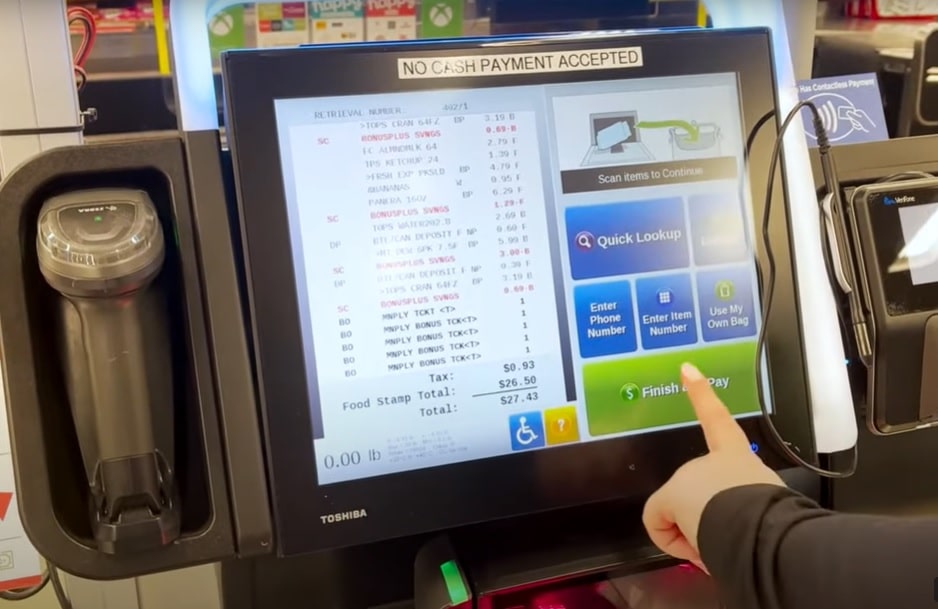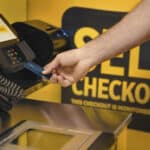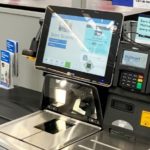
State lawmakers across the country have proposed everything from limiting the number of items allowed at a self-checkout, to giving shoppers a discount for using one. A self-checkout measure in Rhode Island is mild in comparison, but it’s now come the furthest toward actually becoming law.
The state Senate has overwhelmingly passed a bill that would limit grocery stores in the state to no more than six self-checkout stations operating at a time, with a minimum of one staffed checkout lane per self-checkout. While various other state-level self-checkout bills have not yet made it out of committee, this Rhode Island bill has become the first to be passed by a full chamber of the state legislature, bringing it one important step closer to possibly becoming law. It now moves to the House for its consideration. A successful vote there would put it on the governor’s desk for his potential signature.
“We have all witnessed in retail settings consumer frustration at self-checkout stations,” Democratic state Senator Valarie Lawson, the bill’s sponsor, told the Senate before the bill’s passage last Thursday. “Especially it can be difficult for elderly consumers. This bill protects those consumers, and the workers.”
At a committee hearing back in March, she further explained that her bill “would provide options for the consumer,” and “improve the environment for workers” who she said are sometimes “forced to manually cover eight to ten of these checkout stations.”
Two union representatives also spoke in favor of the measure. “Employers have found this is a way to cut payroll and basically make the customers do the work of their employees,” Timothy Melia, President of UFCW Local 328, told the Senate Committee on Commerce. Many times, he said, “there may be one or two lines that are open in the supermarket with 10 or 15 registers and only two live cashiers on there.” What stores are doing, he alleged, “are driving their customers to these self-scan registers” whether they want to use them or not.
And grocery shoppers shouldn’t be forced to scan and bag their own items if they don’t want to, said lobbyist Rick McAuliffe, speaking on behalf of the union. “There’s a trend recently in various places to get rid of these self-scanners,” he noted, as retailers from Walmart to Dollar General to Safeway have been taking self-checkout stations out of many of their stores. “This bill does not eliminate at all self-scanners,” he pointed out. It just ensures that shoppers really do have a choice.
A retail representative disagreed. “Self-checkout is really a consumer’s choice,” Scott Bromberg, President & CEO of the Rhode Island Food Dealers Association, argued. “A large number of consumers use them and appreciate them because it saves them time.” He also questioned why the measure only pertains to grocery stores. Self-checkouts are “at your hardware store, they’re at giant pharmacies, they’re at fast food locations, they’re at dollar stores, value stores, you really see them everywhere now,” he said. “So we’re really confused and a little concerned why our industry is being picked out here to represent the ills of self-checkout.”
As mentioned, the “ills of self-checkout” have inspired several similar proposed pieces of legislation in other states. California is considering a bill that would limit self-checkout purchases to no more than ten items, it would require a staffed checkout lane for every self-checkout terminal, and would ensure that employees would not have to monitor more than two self-checkout stations at a time. In Oklahoma, meanwhile, lawmakers are considering a bill that would also mandate at least one traditional staffed checkout lane per self-checkout station in all grocery stores, in addition to giving self-checkout users a 20% discount off their total.
Rhode Island itself considered such a bill last year, with a smaller 10% discount on offer. But that provision was later stripped from the newest version of the bill, which now matches the current Senate version.
Democratic state representative Megan Cotter, the House bill’s sponsor, said last year that her modest goal was simply to “start a conversation” about self-checkouts. But with a 33-2 favorable vote in the state Senate, giving the bill plenty of momentum heading toward a potential House vote, the measure has progressed a lot further than merely starting a conversation.
“I understand that this technology is coming. This train has been coming for many years now,” Melia the union president said of self-checkouts. But “I think there has to be a balance.”
Retailers that have been installing and/or removing self-checkouts in recent years have been trying to find that balance themselves. But soon, in at least one state, they may find that catering to self-checkout fans and foes alike will soon be required by law.
Image source: Tops Friendly Markets













